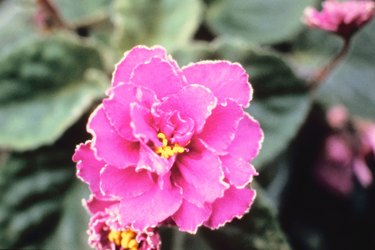
African violets are flowering plants often grown indoors, as houseplants. These plants are characterized by blooms in shades of purple, red, blue, white, pink and lavender. While African violets are easy to maintain, home gardeners should provide adequate amounts of food and water for proper plant growth and vigor.
Identification
Video of the Day
Also known as Saintpaulia, African violets are available in both single and double blooms. These plants easily adapt to indoor light and the dry indoor air. African violets thrive when temperatures are around 60 degrees Fahrenheit at night and 80 degrees Fahrenheit during the day. Extremely cool temperatures cause African violets to become stunted and have reduced vigor.
Video of the Day
Watering
According to Purdue University, the amount of water African violets need to thrive and grow depends on several factors such as the environmental conditions, size of the pot, soil used and drainage in the pot. Provide your African violets with a method that keeps the potting soil moist and keeps the crown of the plant dry. Apply room temperature water to the soil of your plants until it drips from the drainage holes in the pot. Provide your plant with more water only when the top inch of potting soil is dry to the touch. Watering any more often will increase the risk of root rot in your African violet.
Fertilizing
While fertilizing your African violet, it is important to avoid over-fertilizing your plant. African violets do not need fertilizing during the winter months, as a rule. African violets growing under artificial light indoors, may require winter fertilization. Apply fertilizers to your African violets when the foliage becomes a lighter color green and when the rate decreases. Most African violets do well with fertilizer applications every four to six weeks. Any water soluble fertilizer labeled for use on houseplants is fine for African violets. Always follow the directions on the label for best results.
Considerations
African violets grow well indoors,with a minimum of care. Providing your plants with plenty of light, especially during the winter will also help them grow and thrive. If artificial indoor light is the only source of light received, be sure your plant gets at least 15 hours of light each day. Placing artificial lights approximately 12 to 15 inches above the plant is recommended for best results. African violets require high humidity levels for good health. Placing a humidifier near your houseplants will provide adequate amounts of humidity.